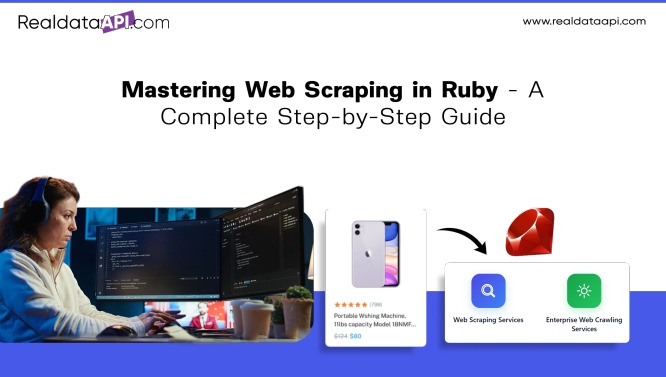


Master web scraping in Ruby with this detailed step-by-step guide, exploring tools, techniques, and best practices to extract data efficiently.
In today’s digital-first world, data powers almost every business decision. From analyzing competitors to tracking customer sentiment, organizations depend on real-time, structured data to stay ahead. But most of this data remains locked in websites. Web scraping provides the key, and while Python and Java dominate the conversation, Ruby is an elegant, powerful, and often overlooked option. With its clean syntax, robust library ecosystem, and flexibility, Ruby is more than capable of handling scraping projects of all sizes.
This guide explores how to master web scraping with Ruby—from basic scraping to advanced techniques, best practices, and scaling with Web Scraping Services or APIs like RealDataAPI.
Ruby is best known for powering Ruby on Rails, but it’s also great for automation and data extraction. Here’s why:
Readable Syntax – Its natural, English-like syntax reduces boilerplate and makes scrapers easier to maintain.
Gem Ecosystem – Libraries like Nokogiri, Mechanize, HTTParty, Watir, and Capybara simplify every stage of scraping.
Flexibility – Ruby integrates seamlessly with APIs, databases, and cloud services.
Scalability – With frameworks and services like RealDataAPI, Ruby scrapers can grow into enterprise-grade crawlers.
If you’re already using Ruby for backend work, scraping fits naturally into your stack.
Nokogiri – For parsing HTML/XML using CSS selectors and XPath.
HTTParty – Makes HTTP requests and works well with JSON APIs.
Mechanize – Automates logins, sessions, and form handling.
Watir + Selenium – Handles JavaScript-heavy websites.
These gems are the backbone of Ruby scrapers and can be combined depending on project requirements.
Setup – Install Ruby, then add gems via Bundler:
Scraping Static Pages with Nokogiri – Fetch and parse content using CSS selectors.
Working with APIs using HTTParty – Easily pull structured JSON data.
Handling Logins with Mechanize – Automate form submission and sessions.
Scraping JavaScript with Watir – Launch a headless browser to extract dynamic data.
Respect robots.txt and terms of service.
Use delays and rate limiting to avoid server overload.
Rotate proxies and user-agents to prevent IP bans.
Handle errors and retries gracefully.
Prefer official APIs when available.
As scraping grows, maintaining scripts becomes time-consuming. That’s where services like RealDataAPI help by offering:
Plug-and-play scraping APIs that return structured JSON.
Geo-targeting for region-specific data.
Anti-bot handling with CAPTCHAs and rotating proxies.
Enterprise reliability with 99.9% uptime.
Ruby + RealDataAPI = powerful, scalable scraping without infrastructure headaches.
E-commerce – Price tracking, product listings, customer reviews.
Finance – Stock data, crypto markets, sentiment analysis.
Travel – Hotel and flight aggregation.
Healthcare – Research and trial data collection.
Jobs – Scraping job boards and salary insights.
Ruby may not dominate web scraping conversations, but its elegant syntax, rich gems, and flexibility make it a serious contender. From parsing static pages with Nokogiri to handling dynamic JavaScript with Watir, Ruby empowers developers to build reliable scrapers quickly.
And when projects scale beyond simple scripts, pairing Ruby with Enterprise Web Crawling Services or APIs like RealDataAPI ensures your data extraction remains fast, accurate, and compliant.
If you’re starting out, begin with small projects, master the basics, and then extend with enterprise-grade APIs. Ruby proves that web scraping doesn’t have to be messy—it can be elegant, efficient, and highly effective.
Source: https://www.realdataapi.com/mastering-web-scraping-in-ruby.php
Contact Us:
Email: [email protected]
Phn No: +1 424 3777584
Visit Now: https://www.realdataapi.com/
#WebScrapingServices
#WebScrapingApi
#EnterpriseWebCrawling
#RealDataApi
